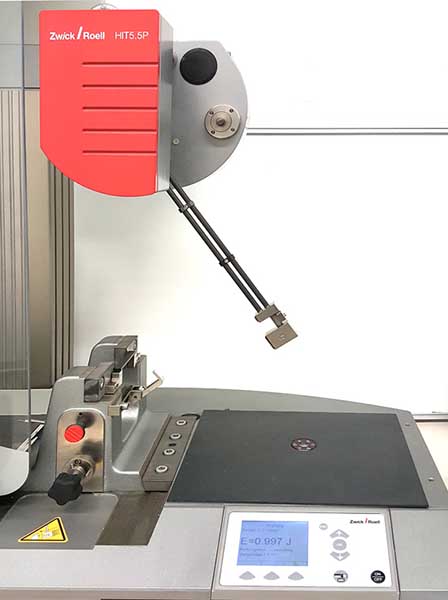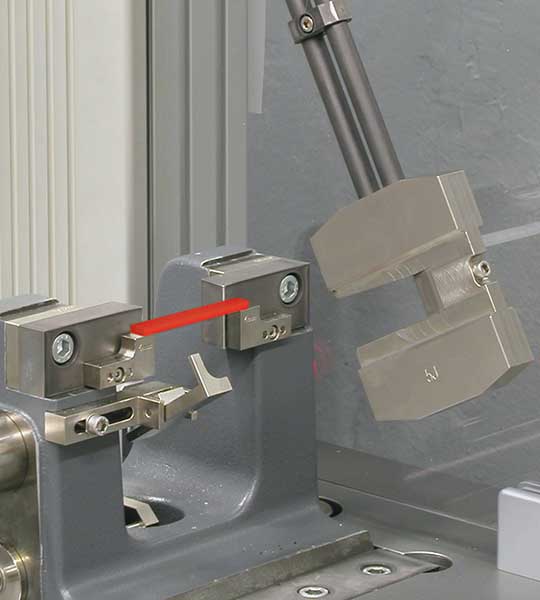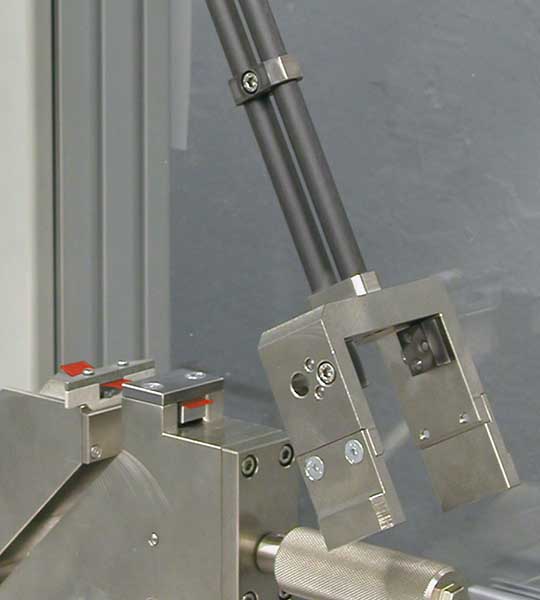We are expanding our material
know-how and test services
with the DEKRA laboratories!
Accredited test laboratory
to DIN EN ISO/IEC 17025.
Your specialist for metals,
plastics, elastomers.
Impact strength - tensile impact strength.
Impact strength is a measure of the ability of a material to absorb impact energy and impact energy without breaking.
The impact strength is measured with the help of a hammer. The impact strength is calculated as the ratio of impact work and specimen cross-section (unit of measurement kJ ∕ m²).
The impact strength can be determined by various types of impact test on a calibrated impact pendulum.
Our services at a glance:
- Impact strength (Dynstat) according to DIN 53435
- Charpy impact strength according to ISO 179
- Tensile impact strength according to DIN 53448
- Izod impact strength according to EN ISO 180
- Drop bolt test according to DIN EN ISO 6603
Impact bending test according to DYNSTAT in accordance with DIN 53435
If no test specimens according to ISO (80x10x4mm) are available, the toughness properties are determined using the DYNSTAT arrangement.
Charpy impact bending test in accordance with DIN EN ISO 179 to determine the impact strength of unnotched specimens
The Charpy impact test is standardized in accordance with DIN EN ISO 179 and is used to assess the toughness of plastics under sudden stress using unnotched specimens. With the Charpy arrangement, the test specimen is positioned on two supports and suddenly stressed in the middle by a pendulum hammer of a pendulum hammer.
Charpy notched impact test in accordance with DIN EN ISO 179 to determine the notched impact strength of notched specimens
In this mechanical test, a standardized specimen of the material to be examined – either with a U- or V-shaped notch – is hit by a falling pendulum hammer on the unnotched back of the specimen.
When it hits the specimen, the hammer releases a certain part of its energy and strong plastic deformation takes place. The kinetic energy initially present in the hammer is consumed and the specimen is smashed.
Impact bending test according to Izod according to DIN EN ISO 180 to determine the impact strength of notched specimens
The determination of the IZOD impact strength is standardized according to DIN EN ISO 180 and is carried out for rigid thermoplastic injection molding and extrusion molding compounds, thermoset materials and thermotropic liquid crystalline polymers as well as for filled and reinforced materials. The use of notched specimens is necessary in order to create a break in ductile materials.
Depending on how much energy the sample absorbed during the impact test, the pendulum hammer swings out on the other side and a drag pointer on the device documents this. Depending on the toughness of the material used, the hammer swings out to different extents.
Tensile impact test to determine the tensile impact strength of unnotched and notched specimens
The tensile impact strength is determined using the tensile impact test. According to DIN 53448, it is often carried out with a pendulum impact tester. A tensile specimen is clamped in such a way that it is stretched or torn off by the pendulum hammer.

Determination of the impact strength on a testing machine with a pendulum impact tester

Charpy impact strength, sample unnotched (source: Zwick)


